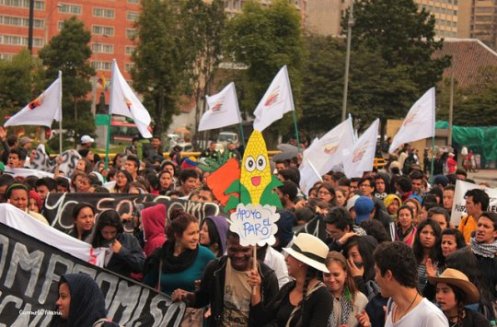Swelling protests continue to rock Colombia for a 12th day as uprisings catalyzed by peasant farmers' cries against 'free trade,' privatization and poverty sustain growing support across civil society. "Long live the farmers' strike! Food sovereignty!" protesters chanted on Thursday during a pots-and-pans ringing march in the capital city of Bogota, while other marches took place across the country. As Common Dreams reported:
"The main staple crops of the country, things like potatoes, rice, which are still predominantly produced by small scale peasant farmers are the ones that are being hardest hit by subsidized crops from these other regions of the world. So these small, poor farmers can't compete with the crops that are coming into the country tax-free." Inter Press Service adds:
Students are among the supporters of the protests. As one protester explained, “We support the farmers, but also we have our own issues, we demand free and good quality education.” Colombia's right-wing President Juan Manuel Santos, who now admits the protests are "valid," is attempting to crush dissent with militarization. “Yesterday I ordered the militarization of Bogota and I will do the same in any region or zone where the presence of soldiers is necessary,” Santos said in a televised address, and readied as many as 50,000 troops. Some Colombian officials including defense minister Juan Carlos Pinzon are blaming the Revolutionary Armed Forces of Colombia (FARC) for involvement in the protests. But Ballvé says that the country has a history of blaming FARC as a means to "delegitimize these mobilizations." In addition to U.S. involvement via trade deals that have devastated rural farmers, its involvement is also seen at the end of some of the weapons pointed at protesters. The marches "have been met with fierce repression by the US-backed military," Ballvé contineud. "So there are obviously billions of US taxpayer dollars being funneled into this military that has one of the worst human rights records in the hemisphere. Twitter users have been offering perspective on the uprising that, so far, has garnered little corporate media attention. Source: Common Dreams |
